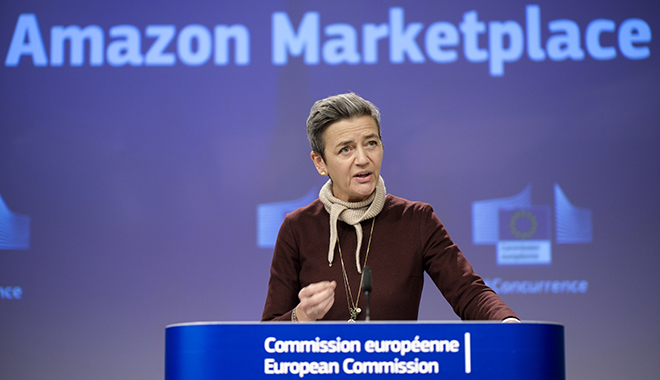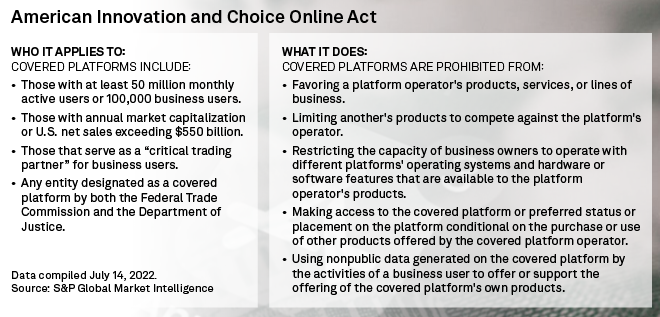S&P Global Offerings
Featured Topics
Featured Products
Events
S&P Global Offerings
Featured Topics
Featured Products
Events
S&P Global Offerings
Featured Topics
Featured Products
Events
Banking & Capital Markets
Economy & Finance
Energy Transition & Sustainability
Technology & Innovation
Podcasts & Newsletters
Banking & Capital Markets
Economy & Finance
Energy Transition & Sustainability
Technology & Innovation
Podcasts & Newsletters
S&P Global Offerings
Featured Topics
Featured Products
Events
12 Jan, 2023

|
Executive Vice President Margrethe Vestager speaks to media at the EU Commission headquarters on Dec. 20, 2022, in Brussels, Belgium. |
Policy experts say the tech firms will likely be spending much of the coming year working with lawyers across the Atlantic to fight existing — and potentially new — lawsuits by increasingly aggressive competition authorities in the European Union. Over the past two years alone, the European Commission has opened about a dozen new investigations, most of them aimed at U.S. tech firms. The investigations allege abuse of dominance in areas such as online display advertising, app store practices and the use of nonpublic seller data.
The focus on legal fights abroad has intensified after the technology industry in 2022 successfully fought off major U.S. legislation that threatened to quash the power of major online platforms including Amazon, Apple Inc., Google LLC and Meta. The American Innovation and Choice Online Act, or AICOA, would have prohibited large tech companies like Amazon from giving preferential treatment to their own products and offerings over third-party competitors. The Open App Markets Act was designed to prevent app stores run by Google and Apple from requiring developers to directly use their in-app payment systems. Neither bill made it to a Senate floor vote before the 2022 congressional session ended.
"In the eyes of Wall Street, some of the body-slam legislation is now out the window," said Daniel Ives, senior equity analyst and managing director at Wedbush Securities. "By having a semi-gridlock [in Congress], Big Tech is a beneficiary."

Focus on Brussels
It remains to be seen whether Big Tech firms will successfully prevent major regulatory action this year in Europe, where antitrust and privacy rules are far more stringent, policy experts say. Breaches of European Union competition laws can result in fines running into the tens of millions of euros as well as required adherence to strict rules that alter how the firms function.
Amazon, for instance, avoided fines as part of two antitrust cases it settled with the EU in late 2022 over allegations of unfair treatment of Amazon's third-party sellers. Under the settlement, the company is required to change how it selects its "buy box" placement on Amazon.com so that third-party sellers are more likely to be included. The company also must refrain from using nonpublic data about sellers on its marketplace for competition purposes.
"You have a greater and greater number of authorities located in major economies that have the ability, through their own decisions, to deeply affect how the firms operate globally," said William Kovacic, a former Federal Trade Commission chair and current law professor at George Washington University Law School. "The U.S. is only one contest among many. It may not even be the most important one."

EU crackdown
As to ongoing investigations, European regulatory authorities are charging the tech companies with allegations of anti-competitive behavior and privacy violations.
Apple, for instance, is facing an €8 million fine in France over an alleged breach of data privacy while utilizing ad personalization on the App Store.
Ireland's Data Protection Commission recently imposed a $411 million fine on Meta, alleging that the company violated EU privacy laws when it sent ads to Facebook and Instagram users based on their online activity. The EU is also investigating Meta's dominance in the online classified ads market.
EU officials in November 2022 began investigating Microsoft Corp.'s $74.01 billion deal to purchase video game publisher Activision Blizzard Inc., which would give the Redmond, Wash.-based company control over popular games such as Call of Duty, World of Warcraft and Candy Crush.
In the U.S., the FTC also filed a complaint in 2022 regarding Microsoft's Activision deal.
European regulators are becoming more aggressive, and any action they take will provide "further stimulus for activity at the FTC but also in the legislatures of the U.S.," Kovacic said.

